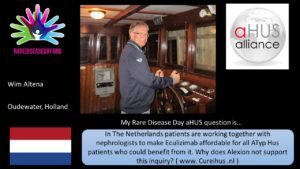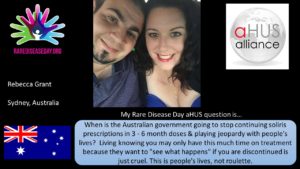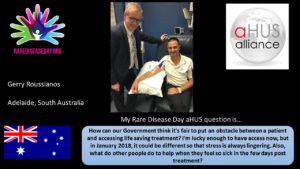There are three questions in the Rare Disease Day video which together exemplify how good can come together from patient stakeholder engagement with the power of evidence.
The are four stakeholders when it comes to health policy decisions:
- Government on behalf of taxpayers/voters,
- Pharma on behalf of share holders
- Clinicians on behalf of patients and their professions,
- and patient groups/patients on behalf of themselves and their families.
The first question is from Wim of Oudewater The Netherlands who asks “ In the Netherlands patients are working together with nephrologists to make eculizumab affordable for all Atypical HUS patients who could benefit from it . Why does Alexion not support this equiry?”

Over several months last year ,the Dutch aHUS patient organisations were , in partnership with some eminent clinicians , in discussions with their Health Authorities to justify continuation of funding of the provision of eculizumab to those in The Netherands who needed it. The Dutch Health Authorities were looking to discontinue funding of eculizumab for aHUS, as they had done so previously for PNH patients.
The Dutch patients chose not just to appeal on emotional terms ,although this was a serious moment facing all patients and their families in The Netherlands, but chose instead to argue on the evidence ,and even the lack of it , and sought a “stay of execution” on the policy until a study could report back to the Health Authorities on safe economic, affordable and sustainable eculizumab dosing and withdrawal strategies. As a result the Health Authority Committee liked what they heard and agreed to a Study taking place with full patient participation. The Study is called CureiHUS, and the Dutch Patient Voice has been powerful.
In Australia, unlike in The Netherlands , the Health Authorities were opposed to eculizumab for aHUS from the outset, but,bit by bit, has extended scope of the drug to treat some aHUS patients. However, treatment has a condition cap of six months, after which eculizumab has to be withdrawn to see what happens to the patient.
Such a protocol, as we can see from just these two questions , creates considerable anxiety in patients, even if nothing may happen to them if eculizumab is withdrawn. Even the term “roulette” is used to describe a clinical decision where some evidence is available to predict outcomes but much is not.

Rebecca of Sydney asks ” When is the Australian Government going to stop continuing with eculizumab prescription in 3 to 6 months and playing jeopardy with people’s lives , living knowing that you may only have this much time on treatment because they want to “see what happens” if you are discontinued is just cruel? This is people’s lives not roulette.”
Gerry of Adelaide, South Australia asks ” How can our Government think its fair to put an obstacle between a patient and accessing life saving treatment ? I’m lucky enough to have access now but in January 2018 it could be different so that stress is always lingering”

The alliance’s affiliate organisation from Australia, APSGA, has met with the Australian Health Authorities several times in the past, and is best able to comment on the points raised by the questioners; and indeed whether The Netherlands’ “way of advocating ” would work in Australia.
What is noticeable, however, is that Australia has been recruiting aHUS patients to help provide evidence in what is actually called the The Evidence Study ( click here for more details ) ,which will be looking at what happens to aHUS patients from around the world in the aHUS Registry after eculizumab dose tapering and withdrawal.
This study is “sponsored” by Alexion, but is being led by three top aHUS researchers from around the world. This partly answers Wim’s question, which is understandable if the aHUS Registry is not known about in The Netherlands.
Whether the Australian Patient Voice can persuade their Health Authorities as part of the evidence discussions is another matter; but it worked in the The Netherlands; and when it comes to the “aHUS patients included” call by the aHUS alliance it demonstrates that it can be done and that evidence can persuade.

